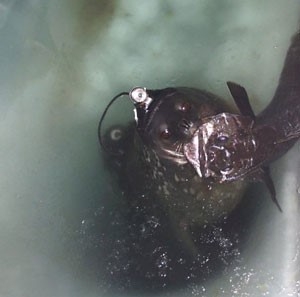 Marine mammals routinely confront extreme physiological and physical challenges when they chase prey underwater while holding their breath. To determine how marine mammals accomplish chases in the deep sea, a team of scientists attached specially designed instruments that recorded high-resolution electrocardiograms, behavior, and flipper movements to bottlenose dolphins and Weddell seals diving from the surface to depths greater than 650 feet! In an article published this week in Nature Communications, the team of researchers, including Professor Lee Fuiman of the University of Texas Marine Science Institute, reported that both the animal’s activity and the pressure that occurs at these great depths affect how the heart performs. It had been expected that chasing prey would increase heart rate, but that diving would slow the heart. Unexpectedly, they discovered that cardiac arrhythmias – irregular heartbeats – occurred in more than 73% of deep dives. Such marked irregularity in the heartbeat changes the widely accepted view of a stereotypic ‘dive reflex’ in diving mammals. These new results help explain why, in human athletes, the swimming segment of cold water triathlons accounts for more than 90% of race day deaths and why heart malfunction is considered a contributing factor.
Marine mammals routinely confront extreme physiological and physical challenges when they chase prey underwater while holding their breath. To determine how marine mammals accomplish chases in the deep sea, a team of scientists attached specially designed instruments that recorded high-resolution electrocardiograms, behavior, and flipper movements to bottlenose dolphins and Weddell seals diving from the surface to depths greater than 650 feet! In an article published this week in Nature Communications, the team of researchers, including Professor Lee Fuiman of the University of Texas Marine Science Institute, reported that both the animal’s activity and the pressure that occurs at these great depths affect how the heart performs. It had been expected that chasing prey would increase heart rate, but that diving would slow the heart. Unexpectedly, they discovered that cardiac arrhythmias – irregular heartbeats – occurred in more than 73% of deep dives. Such marked irregularity in the heartbeat changes the widely accepted view of a stereotypic ‘dive reflex’ in diving mammals. These new results help explain why, in human athletes, the swimming segment of cold water triathlons accounts for more than 90% of race day deaths and why heart malfunction is considered a contributing factor.The articles citation is: Williams, T.M.; Fuiman, L.A.; Kendall, T.; Berry, P.; Richter, B.; Noren, S.R.; Thometz, N.; Shattock, M.J.; Farrell, E.; Stamper, A.M.; and R.W. Davis. 2015. Exercise at depth alters bradycardia and incidence of cardiac anomalies in deep-diving marine mammals. Nature Communications 6, Article number: 6055 doi:10.1038/ncomms7055.